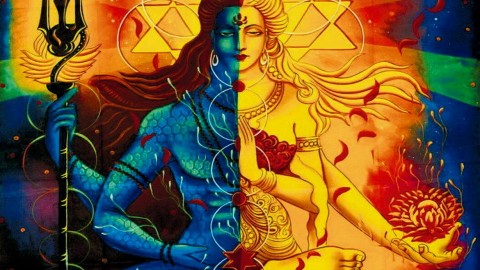Consolations – In Gita Verse 2.28 All created beings are unmanifest in their beginning, manifest in their interim state, and unmanifest again when annihilated. So what need is there for lamentation?
Living The Divine Paradox: Embracing the Impermanence of Existence
As we delve into the profound depths of the Bhagavad Gita, we find Lord Krishna imparting wisdom that pierces through the veils of illusion. “Every being,” he proclaims, “exists in an unseen form before birth, comes into manifestation in life, and reverts to the unseen upon death. Why, then, is there a space for sorrow?”
Through this exploration, I humbly present an understanding that aligns with Krishna’s timeless insight. This universe and our presence are in a constant dance – visible in one moment, concealed in the next. Like a grand tree whose essence lies hidden within a modest seed, our very being encapsulates the infinite cosmos.
Nature’s law elegantly enacts this dance of existence without requiring our intervention, so why do we burden ourselves with undue grief? Life is indeed precarious, akin to a delicate stream of dreams, each capable of being disrupted by the slightest disturbance.
It is not in seeking solace through explanations that we come to know the elusiveness of life, but in confronting the stark, sometimes harsh truth of our existence. This truth may deliver a pain that shakes our core, but it also holds the key to our awakening. For Krishna seeks not to soothe Arjuna with empty consolations but to awaken him to the potential of his enlightenment through the reality of war and suffering.
This recognition – that life is no more than a transient passage, a dream dissolving at the cusp of realisation – calls upon us to embrace awareness. Let us quiet the incessant questioning of “why,” and instead, observe the grand mystery that surrounds life and death – a riddle beyond the grasp of reason.
Life’s abrupt jolts, the kind reminiscent of Arjuna’s impending conflict, can fracture our world, offering an entryway to realms previously unimagined. Recognise that everything we perceive, including ourselves, is ephemeral, a mere stopover in the journey of eternity. But there remains a constant – the act of witnessing.
This act of witnessing, being the impartial spectator amidst the flux, brings about a profound understanding. It is the light that illuminates the path, revealing the essence of all that is and all that will be. Witnessing is not the solving of life’s puzzles but the embrace of its profound mystery.
To witness is to observe without attachment, to watch the rise and fall of experiences with equanimity. In doing so, one cultivates a deep understanding that transcends the superficial ebb and flow of circumstances.
The metaphor of ‘light’ here symbolises awareness and insight. Just as light makes visible what is otherwise unseen, the act of witnessing clarifies the true nature of existence. It shows that the essence of reality isn’t found in the constantly changing aspects of life, but rather in the awareness that observes them.
Finally, witnessing as described here isn’t about seeking solutions or unravelling the complexities of life’s many challenges; rather, it is about accepting and living within the mystery of existence. It means recognising that some questions are beyond answers and that there is beauty and wisdom to be found in the act of simply observing and being present with what ‘is’, without the need to dissect or solve it. This form of presence and acceptance is itself a profound practice and realisation on the spiritual path.
Therefore, heed Krishna’s guidance. Stand firm in the midst of life’s battles, not as one consumed by anguish but as the eternal witness, the embodiment of conscious awareness. Carry out your duties, but remember, above all, you are the unwavering observer, untouched by the transient, bathed in perpetual serenity.
Tags: Consolations





